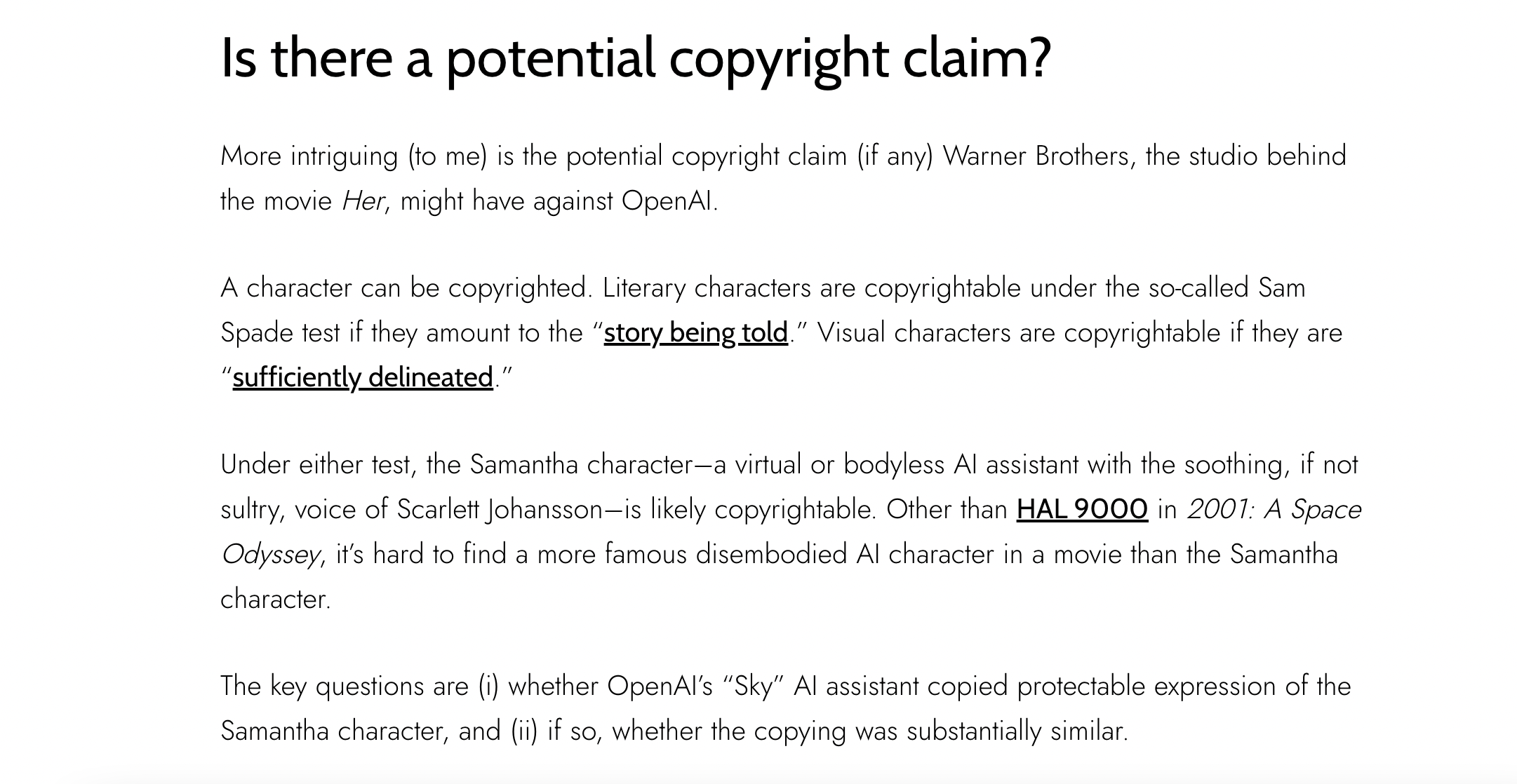By now, plenty of legal commentary has been offered about the potential right of publicity claim Scarlett Johansson may have against OpenAI for publishing an AI assistant named “Sky” whose voice sounds like Johansson’s. Some have suggested there might be a copyright claim if OpenAI used parts of the movie to train its AI voice cloning, or a trademark claim if consumers are likely to be confused that Johansson endorsed the similar sounding voice of Sky.
For a quick summary of the controversy, click here.
Is there a potential copyright claim?
More intriguing (to me) is the potential copyright claim (if any) Warner Brothers, the studio behind the movie Her, might have against OpenAI. This issue has slipped under the radar so far.
A character can be copyrighted. Literary characters are copyrightable under the so-called Sam Spade test if they amount to the “story being told.” Visual characters are copyrightable if they are “sufficiently delineated.”
Under either test, the Samantha character in Her–a virtual or bodyless AI assistant with the soothing, friendly, if not flirtatious, voice of Scarlett Johansson–is likely copyrightable. Other than HAL 9000 in 2001: A Space Odyssey, it’s hard to find a more famous disembodied AI character in a movie than the Samantha character in Her. A prior case involving the use of a James Bond-like character in a Honda commercial suggests there’s at least a triable claim.
The key questions are
(i) whether OpenAI’s “Sky” AI assistant copied protectable expression of the Samantha character, who is an AI assistant depicted in Her, and
(ii) if so, whether the copying was substantially similar.
These are both factual questions–left for the jury to decide. But a court might have a role to play in identifying unprotectable expression, such as stock characters, scene a faire, and mere ideas, at least if the court found that no reasonable jury could find an element copyrightable based on the evidence, such as the idea of a virtual AI assistant with a soothing voice of a woman.
Although OpenAI said it hired a different voice actor for the Sky voice and denied trying to make it sound like Johannson’s voice, a jury would ultimately decide the facts if this issue is ever subject to litigation. A jury could find that some revelations–Sam Altman’s two overtures to Johansson’s agent to do voice work, including one allegedly just 2 days before OpenAI’s public demo of the Sky AI assistant–cut against the denial. There’s also Sam Altman’s tweet of “her” on May 13, 2024, the same day of OpenAI’s splashy preview of its GPT-4o model, with a demo involving the Sky AI assistant.
Who is her?
Some third party reactions saw the similarities with Her, including “a real-life version of Samantha from ‘Her.’”
Samantha AI assistant in Her movie
Sky AI assistant demo by OpenAI
What about fair use?
Of course, even if there’s an arguable copyright claim, OpenAI would likely have a colorable fair use defense. The Her movie and Samantha character are fictional works for entertainment. GPT-4o and its virtual Sky AI assistant are computer programs used for functional purposes. There’s a decent argument that whatever use OpenAI may have made is transformative and not substantially similar to the entertainment, fictional purpose of the Her movie.
On the other hand, Warner Brothers could argue that AI assistants are designed to be conversational, including entertaining just like the Samantha character. As Kyle Orland favorably reviewed GPT-4o for Ars Technica: “As I watched through OpenAI’s GPT-4o demos this afternoon, I found myself unconsciously breaking into a grin over and over as I encountered new, surprising examples of its vocal capabilities. Whether it’s a stereotypical sportscaster voice or a sarcastic Aubrey Plaza impression, it’s all incredibly disarming, especially for those of us used to LLM interactions being akin to text conversations.”
Plus, Warner Brothers could argue that OpenAI’s alleged use substitutes or supplants the licensing of the Samantha character in derivative markets such as in actual AI assistants.
This strikes me as a novel issue. Factual (and mind-bending) enough to survive a motion to dismiss.
It would make for an excellent copyright exam question. But is there a possibility of real lawsuit? Seems doubtful, more so due to the complicated business aspects such a lawsuit would raise. OpenAI has previewed its text-to-image generator, Sora, with Warner Brothers and other movie studios.
How Vanna White v. Samsung Electronics is different
Some people have pointed to the White v. Samsung Electronics America decision to support the view that what OpenAI allegedly did would not be the basis for liability. Samsung ran ad that “depicted a robot, dressed in a wig, gown, and jewelry which Deutsch consciously selected to resemble [Vanna] White’s hair and dress. The robot was posed next to a game board which is instantly recognizable as the Wheel of Fortune game show set, in a stance for which White is famous.”
The precedent is relevant to a right of publicity and Lanham Act claim, but it didn’t involve any copyright claim. Understandably: Vanna White is a real person, not a fictitious character. Vanna White herself is not copyrightable. By contrast, the Samantha AI character in Her is likely copyrightable. And that makes a world of difference.
*None of this article constitutes legal advice.
